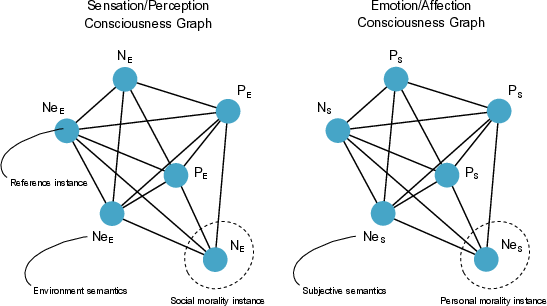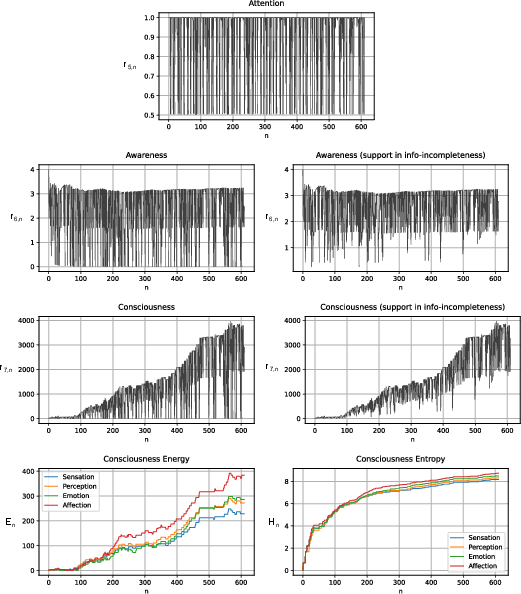- The paper introduces a multi-layered computational model that simulates consciousness by integrating sensation, perception, emotion, attention, and awareness.
- It employs convolutional neural networks and FCNNs to classify emotional responses, validated through metrics like cognitive tension and entropy in graph structures.
- The study draws parallels with human cognitive processing, noting limitations in agent interactivity and proposing future reinforcement learning approaches for enhanced modeling.
From Smart Sensing to Consciousness: An Info-Structural Model of Computational Consciousness for Non-Interacting Agents
The paper "From Smart Sensing to Consciousness: An info-structural model of computational consciousness for non-interacting agents" explores a computational approach to modeling consciousness within non-interacting artificial agents. The proposed model assumes that consciousness emerges from the integration of several cognitive tasks, namely sensation, perception, emotion, affection, attention, awareness, and consciousness itself. This essay provides a detailed analysis of the theoretical framework and experimental validation presented in the paper.
Theoretical Framework
Multi-Layered Cognitive Model
The model builds upon a layered structure, wherein each cognitive task is hierarchically processed. It posits that:
Attention and Awareness
The model stresses the importance of attention as a selection mechanism, determining which stimuli are processed further. Awareness is defined through probability, plausibility, credibility, and possibility of sensory and emotional inputs, using a decision and reasoning framework under info-incompleteness conditions. These cognitive states are encapsulated within hyperspheres in a multi-dimensional space, allowing representation and processing of subjective experiences.

Figure 2: On the left, a qualitative 2D representation of the Awareness Hyperspace; the centers of the hyperspheres represent the reference cognitive instances ri,m.
Implementation Details and Experimentation
Sensory Acquisition and Emotional Classification
By utilizing a convolution-based neural network, specifically VGG16, the system processes visual stimuli into cognitive instances for each layer. An FCNN acts as a learner to classify emotional responses into categories such as happiness, anger, fear, and neutrality. The system achieves substantial accuracy in emotional prediction, thereby validating the model's ability to represent subjective emotional activity computationally.
Attention and Awareness Hypotheses Testing
Attention is quantitatively analyzed with metrics such as cognitive tension, demonstrating alignment with covert attention phenomena documented in human studies. Both awareness and consciousness levels are assessed through entropy and energy metrics in graph structures, revealing nuanced insights into the subjective interpretation of stimuli.

Figure 3: A qualitative representation of the Sensation, Perception, Emotion, and Affection Consciousness Graphs. NE, PE, and NeE indicate environment semantics, and NS, PS, and NeS indicate subjective semantics.
Discussion
Correlations with Human Cognitive Processing
The results obtained underscore similarities with human cognitive processing, particularly in attention and emotion-driven responses. The model effectively mimics observed human covert attention bias, particularly in response to disgust-related stimuli. Awareness metrics, weighted by both internal processing and external information credibility, offer new pathways to understanding self-awareness analogs in machines.
Limitations and Future Work
While offering a strong foundational model, the paper acknowledges limitations, particularly in the non-interactive nature of the agents. Future work is suggested to explore reinforcement learning to incorporate causality and actions, potentially enriching agent-environment interactions and extending the consciousness model to interactive scenarios.
Conclusion
The paper presents a sophisticated model of computational consciousness, bridging theoretical concepts with practical implementations. By integrating emotional and moral dimensions, the proposed framework provides a comprehensive approach to artificial cognitive systems, advancing the understanding of machine consciousness. Future work can extend these concepts into interactive domains, fostering deeper engagements with AI systems.

Figure 4: Trends of cognitive instances r5,m, r6,m, r7,m associated with Attention, Awareness, and Consciousness, respectively.





